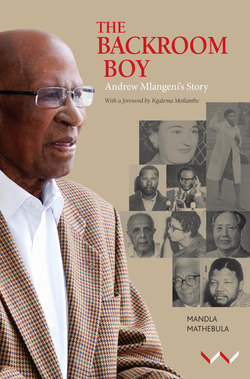Читать книгу The Backroom Boy - Mandla Mathebula - Страница 6
На сайте Литреса книга снята с продажи.
Introduction
ОглавлениеThe Lydenburg farm, Boomplaats, in the then Eastern Transvaal, was purchased by Africans in the early 1900s, before the 1913 Land Act prohibited such transactions. The community on the farm Boomplats, according to my late mother, Lydia Matshidi Rasethaba, was the landowner, under a Chief Dinkwanyane. This community regarded the land that they occupied in Boomplaats as something worth fighting for. One rainy night in 1961, when I was only three years old, the police came and demolished their homesteads and forcefully removed them to arid and unproductive land.
The New Age, an influential newspaper in Johannesburg from 1953 to 1962, dispatched Andrew Mlangeni and Joe Nzingo Gqabi to cover the removals when the Dinkwanyane community was forcibly removed. The two were arrested by the police as they left the African ‘reserve’.
The exclusion of this event from this book was better explained by Andrew Mlangeni when he said that there is so much to relate about his life that he could not tell it all. Hopefully, as time goes on we shall have the benefit of learning more, as more and more veterans tell their stories and corroborate what happenned.
It took months of persuasion and convincing to get Andrew to relate his life experience. The answer was always that ‘my organisation, the ANC, has not yet released me to tell its secrets’. As a loyal servant of the African National Congress he was reluctant to divulge its secrets. Once he agreed, it was a kind of reflection of the reality of life in South Africa during the 1960s. This was the time of radical and defiant campaigns against the apartheid regime and its beneficiaries, whose racist thinking sought to impose on the masses of the people their backward doctrine of ‘separate development’.
At a meeting of the Umkhonto we Siswe (MK) High Command convened to discuss, inter alia, a report on MK trainees who had just returned from China, it was established that the Chinese assessment had identified Naidoo as the most gifted and had the most initiative, but he also had a weakness – laziness. The report further identified that Gqabi was also smart, but his weakness was that he was too ambitious and wanted leadership positions regardless of his ability.
Mhlaba was identified as easygoing and a man who would do anything he was instructed to do – no matter how difficult – with a smile. Mthembu, stated the report, was predisposed to breaking down easily under pressure from the enemy. Andrew was identified as lacking initiative, but as someone who was loyal and committed to the programme of his movement.
Govan Mbeki informed the comrades that they were all going to be members of the National High Command and the implications thereof, and their respective roles. They were to assume their functions immediately. The struggle was up and running and there were things to be done.
In the same meeting it was decided that Andrew was to take over Joe Modise’s duties, including the recruitment of people for military training and transport. He was given a programme that he was to start implementing immediately, and which included travelling across the country to explain to regional commands the programme of MK and to mobilise for more recruits in support of the provisions of Operation Mayibuye.
Andrew’s frame of mind is that of a multifunctional device (MFD) with the added functionality of centralised document management, and large-scale production and distribution. From the onset, Andrew had demonstrated his yearning to deliver and never to disappoint. He was prepared to do what the High Command instructed him to do. Like an MFD, he was a printer, scanner, fax, copier, document storing device and network distributor.
From the frst day, from his home in Dube, Soweto, Andrew threw himself into implementing his task as the MFD, transforming himself into Rev. Mokete Mokoena on a crusade to overthrow apartheid through the armed revolutionary struggle.
As he points out in the book, he had other responsibilities apart from his MK tasks. There was a psychological pay-off too. In the small domain of an MFD, he had what the big world rarely gives to 30-year-olds: the chance to say yea or nay and have his instructions followed to the letter. It was a small but real kind of power.
Andrew and his comrades shared a broad radical worldview, but received much inspiration from the Chinese. If apartheid represented bad ideas with rough edges, they were on the opposite side.
Thirty years after Andrew and his comrades had embarked on the political liberation journey, the ANC won the 1994 election, and the tough task of radical economic transformation was started.
This is the story of the Backroom Boy.
Sello Mashao Rasethaba Donor and Trustee of the June and Andrew Mlangeni Foundation
